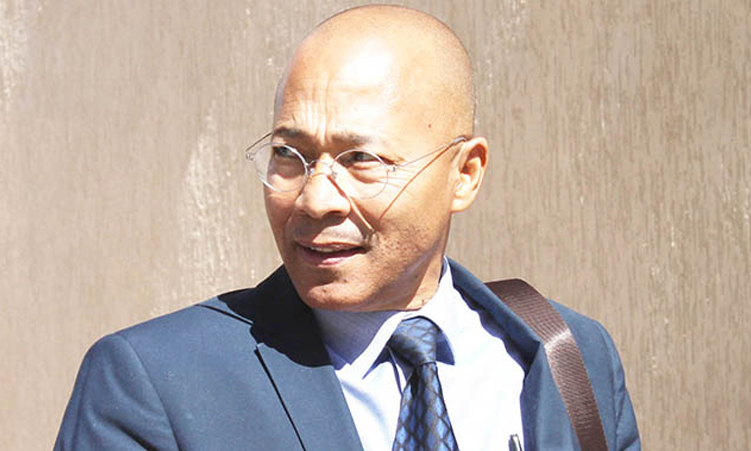17 July 2024
We meet here today when our country is still in shock and sadness, following the passing of two of our leaders over the past weekend.
As we are aware, comrade George Trepper, former regional councillor for Windhoek West, unfortunately passed away on Saturday, 13 July.
This was sadly followed by the passing of comrade Katrina Hanse-Himarwa, the former minister of education, on Sunday, 14 July.
May I ask you to stand up and observe a moment of silence in honour of our great fallen leaders. On that sad note, allow me to express appreciation and gratitude to Dr Audrin Mathe, the executive director of information and communication technology, for always extending invitations to me to attend and speak at the engagements organised by the ministry.
I should say that many of Dr Mathe’s engagements are always well organised. To support my statement about the great job done by the Ministry of Information and Communication Technology (ICT), I refer to the announcement made last week of Namibia being accorded Africa’s leading country in press freedom.
This was published in the 2024 World Press Freedom Index, beating countries such as Seychelles, South Africa, Mauritius and Cape Verde, to mention a few. Let’s give ourselves a round of applause.
I wish to call upon all of us to ensure that we retain this number-one position in 2025 and beyond. Our late president, Hage Geingob’s commitment to press freedom has been lauded by many local journalists, media unions and bodies, who said that he had allowed them to practise their craft freely – without fear, favour or prejudice. At the official World Press Freedom Day celebrations in Windhoek in 2017, the late Geingob had said: “As long as I am the head of state, press freedom in Namibia is guaranteed.”
Indeed, press freedom is guaranteed in Namibia. It is for that reason we have scooped the number-one position. May his soul continue to rest in eternal peace!
I have observed that many of our topics today are related to ICT. In this regard, it is important to note that ICT has become an enabler in the provision of public services to our citizens. Therefore, I am happy that most of the topics today have an effect on the lives of our ordinary Namibians, as well as, on improving public service delivery. Speaking of public service delivery, we need to find innovative ways to ensure we render service to the public more efficiently and effectively.
As you would be aware, the late president had appointed a fourth Industrial Revolution (4IR) task force, chaired by prof Anicia Pieters. This task force finalised its work and submitted a report with key recommendations that were approved by the Cabinet in August 2022.
Almost two years after the fourth Industrial Revolution recommendations were approved, I think it is time we start with the process of examining to what extent we have implemented those recommendations. In this regard, I would like to request the ministry’s executive director to work together with my office so that the state of the implementation of the fourth Industrial Revolution recommendations becomes a subject matter of discussion at the next meeting of executive directors (EDs).
We need to examine them as EDs and chief regional officers (CROs), because we are the implementers of government policies, programmes and projects. Notwithstanding the above, I should also commend ourselves as implementers in the area of 4IR and digitalisation.
We have noted excellent work in this area from several ministries, including the Ministry of Home Affairs, Immigration, Safety and Security for automating many of the services they render to the public. With that said and taking into account the topics being discussed here, I would like us to rethink our roles as accounting officers/implementers in the public service delivery equation.
Very often when we are asked: “What do you do?” We proudly say: “I am the ED of a particular ministry, or the CRO of a particular regional council.” The question does not ask for our positions in the organisation, but what we do in that organisation. Simply said, we are the implementers of policies, programmes and projects at our various institutions. While our major preoccupation should be that of implementing government policies, programmes and projects, we should always keep it at the back of our minds that we are not policymakers. However, we advise and assist in the policy formulation process.
This brings me to another important item which I think needs to be addressed. This is about our working relationship (EDs and CROs) with our political principals, which, if not addressed, can derail public service delivery. This relationship is commonly known as the political and administrative interface in the literature of public administration and public management.
It is important to note that the success of policy development and management depends to a large measure on the effective, meaningful and functional relationship between the political head (in our case, the minister, or the chairman of the council, or the governor of the region) and the administrative head, (the ED or the CRO) in the public service.
This interface should be seen in the context of the functional behaviour, attitudes, mindset, power relations and competencies of the elected and appointed officials in the performance of our official duties. In this relationship, clarity of roles is extremely important. The political head is not expected to be an administrator, but a policymaker, while the administrative head is expected to administer the policies that the political head formulates. However, in the process, the political head will inevitably involve himself in administrative matters which have a political connotation and content. While politics and administration formally should be separate, in practical terms, there is a fine and delicate line across which there could be slippage by both administrators and politicians.
Unfortunately, there are no standing rules and procedures which guide the behaviour of either of them, and which clearly define their respective roles and expected behaviour to each other. In the absence of such rules, the personalities of the two become a major factor in the success or failure of the interface in managing public services as an instrument of the state machinery.
However, in the ministry or regional councils, where frequent dialogue between the political head and the administrative head is maintained, the issues and concerns facing the ministry or council are likely to be more openly addressed. When trust and respect do not exist between the two sides, the relations can deteriorate sharply and may give rise to the ‘betrayal theory’ and suspicions of what could be referred to by politicians as ‘bureaucratic sabotage’.
We should avoid that at all times. We should always maintain a good working relationship with our political principals so that service delivery is not compromised.
Furthermore, in addition to a good working relationship with our political principals in order to enhance service delivery, we should also keep the following in mind all the time:
a) Avoid working in silos: To those who attended the decentralisation engagement organised by ministries of ICT and of urban and rural development in September 2023 at Otjiwarongo, you would recall that I spoke about this issue. Silos affect the public service delivery, because they represent a mindset problem, although not a structural one. The silo mentality is part of human nature. People want to work hard and stay focused on their areas of expertise. However, studies have shown that projects have better results with a collaborative push across offices, ministries and agencies, instead of multiple individual efforts. It is common cause that silos persist in the government, because you as EDs and CROs allow them to. I therefore call upon all of you to desist from such behaviour.
b) Collaboration-consultation-coordination (triple C): Many nations are progressing exceptionally well on policy implementation because they use the triple C approach. Calling a fellow colleague for a consultation on a particular matter does not make you look like you do not know anything. We can only succeed if we work together. Without consultation and coordination, we end up doing the same work, which leads to resource wastage. Earlier I spoke about the excellent work we are recording at home affairs, immigration, safety and security. This is attributed to collaboration with the Office of the Prime Minister in automating some of the services the ministry renders. If you decide to go alone, be ready for the consequences of that. In the world we live in now, the consequences could be as heavy as the non-renewal of your work contract. When that happens, do not blame anyone but yourself.
c) Be a team player: How do the people at your institution see you? Are you a team player or a boss? Are you easily available for consultations with your teams? Do you assist your teams to achieve goals, or do you wait until failure is reported, and you then blame your team? These are some of the questions we should ask ourselves. Team players actively listen to their teammates, respect their ideas and aim to improve the product or process at hand. Do not be a dictator at the office as you are likely to fail in implementing government projects.
d) Use resources in a prudent and optimal manner: Effective resource management is non-negotiable if you want your projects to achieve the desired results. Resource management in project management involves identifying and allocating all the necessary project resources. In general, resource management requires you to plan and put project resources to good use while taking into account your schedule, deadlines, resource availability, and so much more. On several occasions many of us return money to the treasury at the end of the financial year. What causes this? Not having a project resource management schedule and plan in place.
e) Having the right team in place: I am sure many of us have heard the public saying that “there is no need to apply for that position as we already know who it is earmarked for”. Why do the public make such statements? This is a question we should all ask ourselves. The Public Service Act, 1995 (Act No. 1995), read together with approved staff rules, calls for a fair and competitive recruitment process in the government. Appoint the right panel members for a particular position, and let the panel recommend the right candidate for you. In our case, the right candidate is the one who scores the highest on an interview. I call upon all of us to follow the approved government recruitment process.
As I conclude, I wish to implore all of us to take these engagements seriously. We should look at our policy implementation rate and devise measures to address all bottlenecks that hinder the successful implementation of our policies, programmes and projects. These forums should not just be talk shows that yield nothing at the expense of the government. It should be forums that attempt to find solutions to our everyday problems.
With these few words, I wish to once again thank you for extending this invitation to me and wish you successful deliberations
Stay informed with The Namibian – your source for credible journalism. Get in-depth reporting and opinions for
only N$85 a month. Invest in journalism, invest in democracy –
Subscribe Now!






